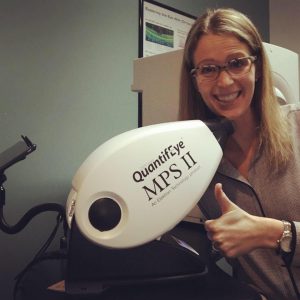Do You Want to Know Your Risk for Macular Degeneration?
Macular degeneration. You have probably heard of it before, you may even know someone who has been diagnosed with the condition. Age related macular degeneration (ARMD) is the leading cause of significant vision loss in Americans 55 and older. It affects your central, detailed vision and in severe cases can cause blindness. So hopefully you are wondering, “Dr. Lynch is there anything I can do to lower my risk for developing ARMD?” Excellent question! And the answer is yes, there are things that everyone can be doing to promote good ocular health and lower their risk for ARMD.
- Wear sunglasses. Just like UV light is harmful to your skin, it is also harmful to your eyes. Aside from causing cataracts, it can also damage your macula, which can increase your risk for ARMD.
- Eat a healthy diet. Dark leafy greens like kale, spinach and broccoli are extremely healthy for your peepers. Another nutritious vegetable that is good for your eyes is orange peppers. Orange peppers are extremely high in Zeaxanthin, which is a key ingredient in ocular vitamins designed to prevent ARMD.
- Speaking of ocular vitamins, take them! Even though you may eat a healthy diet, it is difficult for even the best of eaters to get 5-9 servings of fruits and vegetables in every day. A special scientific study was done to determine the top antioxidants and vitamins found in the foods we eat that are good for the macula. This study was called AREDS2. For those who have been diagnosed with ARMD or have ARMD in their families, the best thing you can be doing to slow progression or prevent the disease is to take a daily AREDS2 ocular supplement. (Consult your eye doc first before starting an an ocular vitamin to make sure you are choosing the right formula for you)
- Last but not least, get your macular pigment density score. Recent scientific research shows a correlation between a high density of pigment cells in the macula and a lower risk of ARMD. Think of these cells like a pair of sunglasses and the darker the sunglasses are, the more they are going to protect your macula from harmful sunlight and blue light (computers, cell phones, TVs). The best part of these pigment cells is that they can be increased or “beefed up” with ocular vitamins if your initial pigment density is less than optimal. The other great thing about this new technology is that, we have it at Full Spectrum Eyecare! So if you are over the age of 55, have a history of ARMD in your family, eat less than 5-9 fruits and vegetables a day or just want to know your risk for potentially developing ARMD, come see us for this test! www.fullspectrumeyecare.com
Check out Dr. Lynch with our macular degeneration risk technology!

